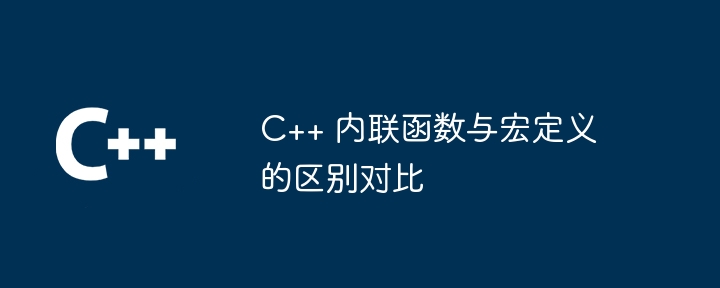
Inline functions are expanded at compile time, and macro definitions are replaced during preprocessing. Inline functions: Accept parameters and have a return type. Can access local variables. Performance is better than macro definition. More readable. Macro definition: Do not accept parameters and have no return type. Local variables cannot be accessed. Performance is worse than inline functions. Provide concise syntax and facilitate customization. Documentation

Comparison of the differences between C inline functions and macro definitions
Introduction
In C, inline functions and macro definitions are two important language features used to improve code performance and readability. While they share some similarities, there are also key differences in behavior and usage.
Inline functions
Benefits:
Grammar:
inline return_type function_name(parameter_list) {
// 函数体
}Macro definition
#define keyword. Benefits:
Grammar:
#define macro_name replacement_text
Practical case
The following shows how inline functions and macro definitions are actually used of:
Inline function:
inline int square(int x) {
return x * x;
}
int main() {
int result = square(5);
// ...
} In this example, the square() function is inlined, expanding to # at the call site ##return 5 * 5;.
Macro definition:
#define MAX_VALUE 100
int main() {
int value = MAX_VALUE;
// ...
}MAX_VALUE is replaced with the constant 100.
Summary of differences
| Inline functions | Macro definition | |
|---|---|---|
| Expand during compilation | Replace during preprocessing | |
| Yes | No | |
| Yes | No | |
| Yes | No | |
| High | Low | |
| High | Low |
Selection Criteria
In general, inline functions are recommended for small and performance-critical code that requires parameters, local variables, or return types. Macro definitions, on the other hand, are more suitable for simple constants or code self-documentation.The above is the detailed content of Comparison of the differences between C++ inline functions and macro definitions. For more information, please follow other related articles on the PHP Chinese website!
 What is an inline function
What is an inline function
 What are the differences between c++ and c language
What are the differences between c++ and c language
 Recommended learning order for c++ and python
Recommended learning order for c++ and python
 Cost-effectiveness analysis of learning python and c++
Cost-effectiveness analysis of learning python and c++
 Is c language the same as c++?
Is c language the same as c++?
 Which is better to learn first, c language or c++?
Which is better to learn first, c language or c++?
 The difference and connection between c language and c++
The difference and connection between c language and c++
 C++ software Chinese change tutorial
C++ software Chinese change tutorial




